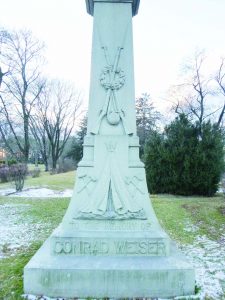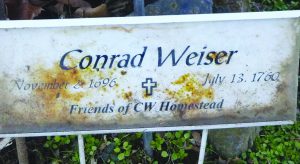by James C. Fulmer | Past President, NMLRA
“You can do anything if you have enthusiasm…Enthusiasm is at the bottom of all progress. With it, there is accomplishment. Without it, there are only alibis.”
—Henry Ford (1863-1947)
What Henry Ford said about enthusiasm is true. Every great idea and accomplishment came from people who had enthusiasm about what they were doing with their lives. No one person influenced the people in my area of the country during the Colonies’ infancy than Conrad Weiser.
Weiser was born on November 2, 1696 in Wuttemberg (now part of Germany). In 1708 a “Foreign Protestants Naturalization Act” was passed by England to allow immigrants to come to England as long as they were Protestants. Due to crop failure and several wars many people took up the invitation by Queen Ann of England. Conrad Weiser’s dad was one of them bringing his whole family. In England they were given food and placed in tent cities outside of London. Over 15,000 immigrants arrived and over 2,000 where eventually sent back because they were Catholic. The rest would be sent to Ireland, the West Indies and some would stay in England but a large group would be sent to North America to help Colonize the new English territory.
On June 13, 1710 the Weiser family would arrive in New York Harbor in America. By fall they would be working for Queen Ann in the ship building business to repay their expenses for passage to America. They would be working as indentured servants. They would work at making a tar pitch for ship building, cutting timber for ship building and cultivating hemp for making ropes for the sailing ships.

Conrad Weiser’s Monument erected 1909.
The business adventure failed because of the wrong choice of pine tree for making pitch and tar and too harsh of a climate. In 1713 the people were discharged from there servitude and declared free. This is when Conrad Weiser’s life would change forever. The people where all out of work now and had to find their own way and once again they found themselves having a shortage of food. In November of 1713 the chief of the Maqua nation named Quaynant visited Conrad’s father, and they agreed that he should go and live with the Quaynant to learn the Maqua language. Maqua is translated to Mohawk in English.
Conrad went and lived with the Mohawks that winter and by spring he had learned the language but also a lot about them as a people. He suffered with them through the excessive cold and by spring he suffered from hunger because there was nothing to eat. He would return to his family in July of 1714.
On November 22,1720 Conrad would marry Anna Eve Feck at the age of 24. He would eventually make his way out of New York State down the Susquehanna River into Pennsylvania and started a farm near present day Womelsdorf close to Reading. Here is where he would start going on long hunts up and over the Blue Mountains. It is said it was on one of these hunts that he would meet Shikellamy, who was an Oneida chief. Shikellamy was pleased to find a white man who could speak his language and knew the Indian traditions and ceremonies. They became fast friends.
Shikellamy was the Iroquois chief who was the emissary to other tribes and the British. So in 1731 when Shikellamy was summoned to Philadelphia to meet with the Pennsylvania governor he chose Weiser to go with him. The Iroquois trusted Weiser and considered him an adopted son of Mohawks. Weiser impressed the Governor and Council so much they placed him in charge of Indian affairs. Weiser would be the interpreter in the follow up council in Philadelphia in 1732.
In 1736 a treaty would be negotiated by Skikellamy, Weiser and the Pennsylvania Council. The deed was negotiated that the Iroquois sold the land drained by the Delaware River and south of the Blue Mountains. With this purchase Pennsylvanians were favoring the Iroquois over Lenape or (Delaware) native Americans. Along with the Walking Purchase of the following year that treaty ended any relationship the Lenape had with the Pennsylvanians. The result would help the Lenape to side with the French during the French and Indian War, but it did help the Iroquois to continue to side with the British.
During the winter of 1737, Weiser made a six-week journey from his home to the Iroquois capitol of Onondaga to broker a peace between southern tribes of Virginia, such as the Catawba and the Iroquois. He managed to convince the Iroquois not to send war parties in the spring. Impressed by his enthusiasm for peace the Iroquois would name Weiser “Tarachiawagon,” or “Holder of the Heavens.”
Conrad Weiser helped to negotiate many peace treaties in 1742 and 1744. The 1744 Treaty of Lancaster was between the Iroquois and the colonies of Pennsylvania, Maryland, and Virginia. During the final day Canasatego, the Onondaga chief spoke of Iroquois concepts on unity. “Our wise forefathers established Union and Amity between the Five Nations. This made us formidable; this have given us great Weight and Authority with our neighboring Nations. We are a powerful Confederacy; and by your observing the same methods our wise forefathers have taken, you will acquire such Strength and power. Therefore whatever befalls you never fall out with one another.” Ben Franklin would later print this speech to help influence the American Colonies on political unity.

Marker next to tombstone.
An old story goes that Shikellamy once went to Weiser saying “I had a dream that Tarachiawagon gave me a new rifle.” Weiser, who owed much of his success to the strict observance of Indian etiquette, answered the dream with a rifle. Some days later Weiser said to the chief, “I too had a dream. I dreamed Shikellamy gave me a large and beautiful island in the Susquehanna.” The Old Chief, we are told, matched Weiser’s politeness, but then said, “Conrad, let us never dream again.”
Conrad Weiser would have his hands full as the French would redouble their diplomatic efforts in the Ohio valley and build a string of forts culminating at Fort Duquesne, at present day Pittsburgh, in 1754.
In 1756, Weiser was appointed along with Franklin to construct a series of forts from the Susquehanna River to the Delaware River along the base of the Blue Mountains. From the Susquehanna westward were Fort Hunter, Fort Manada, Fort Swatara, Fort Henry, Fort Northkill, and Fort Lebanon. Fort Henry was the nearest to Conrad Weiser’s home and this is where all the supplies would be distributed from for the upcoming defense of the then frontier. There is much history about each and every one of these forts. Enough to write stories about them and how they helped protect the then new frontier.
Conrad Weiser performed his duties in the armed defense of the frontier until he resigned in 1758. He died July 13, 1760 at the age of 63. The list of all his achievements is endless. His gift of being a statesman is secured for all time. George Washington said about Conrad Weiser: “This departed man rendered many services to his country in a difficult period, and posterity will not forget him.”




